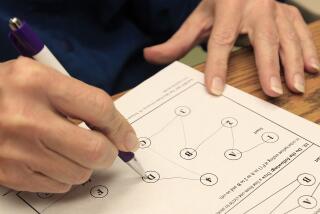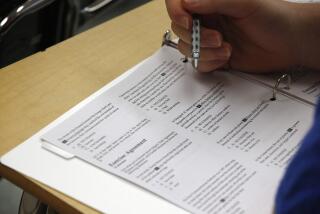For Equality’s Sake, the SAT Should Be Abolished
- Share via
It may be surprising, as reported recently in The Times, that upper-middle-class white families “work the system” to gain an advantage for their children on the SAT. Many people believe that the SAT is designed to provide colleges a fair method for making entrance decisions. In fact, the development of the SAT was influenced by a desire to decrease access by certain ethnic groups, and it continues to play that role. Both IQ tests and the SAT originated during an era of fear of the new immigrants from eastern and southern Europe in the late 19th and early 20th centuries. A key figure in developing IQ tests and the driving force behind the SAT was Carl Brigham. In his 1923 book, “The Study of American Intelligence,” Brigham claimed to prove that people from northern and western Europe were more intelligent than the more recent immigrants. He wrote: “Our study . . . has pointed at every step to the conclusion that the average intelligence of our immigrants is declining.” He added that “our figures, then, would rather tend to disprove the popular belief that the Jew is intelligent.”
African Americans received Brigham’s greatest contempt: “The decline of American intelligence will be more rapid than the decline of the intelligence of European national groups owing to the presence here of the Negro.”
Brigham was not an isolated fanatic. Many psychologists and geneticists from leading American universities joined him in the eugenics movement, an attempt to decrease the reproduction from so-called inferior racial and national groups. Edward East, a Harvard geneticist, for example, wrote: “Gene packets of African origin are not valuable supplements to the gene packets of European origin; it is the white germ plasm that counts.”
The eugenics movement in this country disappeared after the Nazis took the belief of racial superiority to its logical and horrific conclusions in the early 1940s. The ideas, however, persist in some places and have had important consequences for education.
The Educational Testing Service, which produces the SAT, claims that the test is not biased. It fails to acknowledge, however, that the test adds very little, if at all, to other predictors and is a major factor in preserving the educational advantages of middle- and upper-class students who often go to schools with better-prepared teachers and can afford to take preparation courses. Of course, the service has a vested interest in maintaining the SAT, since its staff salaries are paid for by student test fees. The proliferation of private courses in which students pay large fees to learn test-taking skills and the attempts to work the system, as described in The Times, are evidence that there is something drastically wrong.
It is essential that educators and policymakers examine the generally unacknowledged assumptions embodied in the use of the SAT and other standardized tests, including:
* It is possible to numerically measure understanding and potential with reasonable accuracy and communicate it meaningfully.
* Standardized testing does not interfere with student learning.
* Performance is independent of the testing environment and culture of the school.
I believe, on the contrary, that:
* No person’s understanding or potential can be reduced to a number, and it is disrespectful to try to do so.
* Standardized testing interferes with student learning by causing anxiety and coercing students to memorize for the test rather than focus on learning. Testing leads teachers to focus on test scores rather than students as complex learners.
* Performance on tests depends on the environment in the classroom, the attitude of the teacher-test giver, the cultural climate of the school and societal messages about intelligence and potential that the student has internalized.
The SAT is a capstone of an educational system that, in spite of the best intentions and dedication of many talented educators, serves to preserve economic inequality. It would be of great benefit to our country if colleges and universities would stop using it.


